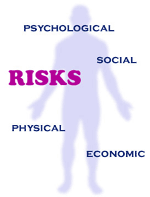While participating in a recent training on human subject protection in research, I was struck by one topic that I would not have normally thought of as a thorny ethical dilemma. In our experience, incentives are usually determined by a balance of the resources an organization can give with what we (the researcher and the organization together) believe will encourage people to participate.
A few weeks ago I wrote about evaluating programs designed to solve problems. In the blog I discussed logic models and how they can be used to understand a program, its activities and intended outcomes. Shortly after writing the blog, the U.S. congress began exploring how to define outcomes for the war in Iraq.
 When conducting an evaluation, we are required to minimize the risks to participants; however we sometimes struggle to identify what those risks may be and how they relate to any potential benefits. Particularly when the study involves issues like the arts, academic achievement or interest in extra-curricular activities, the risks may seem very remote or negligible.
When conducting an evaluation, we are required to minimize the risks to participants; however we sometimes struggle to identify what those risks may be and how they relate to any potential benefits. Particularly when the study involves issues like the arts, academic achievement or interest in extra-curricular activities, the risks may seem very remote or negligible.